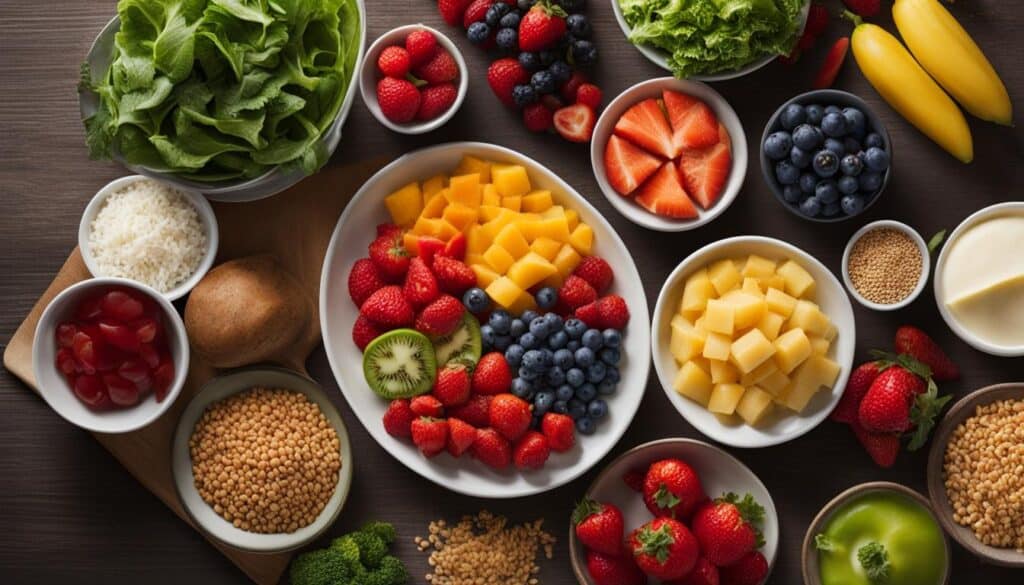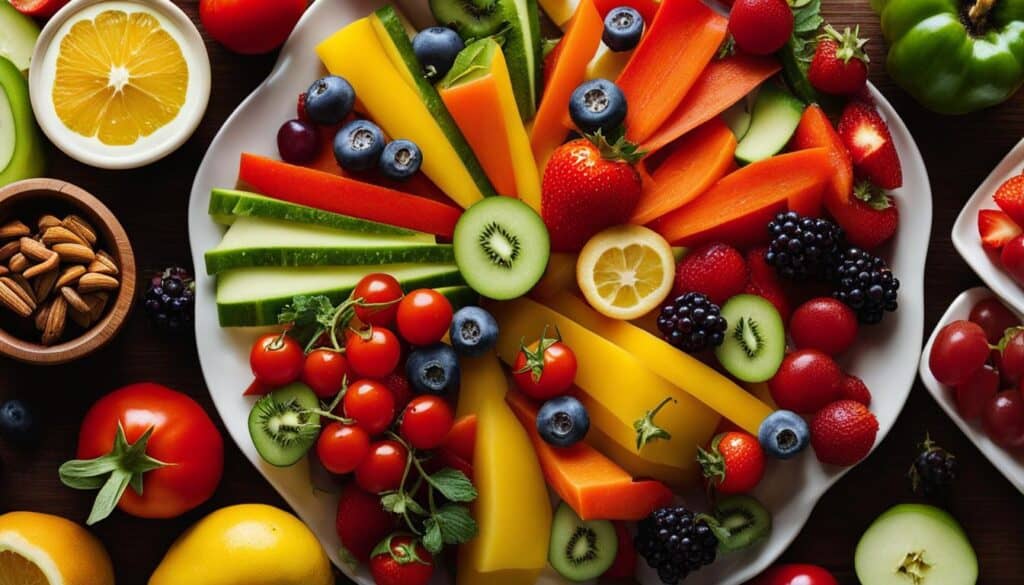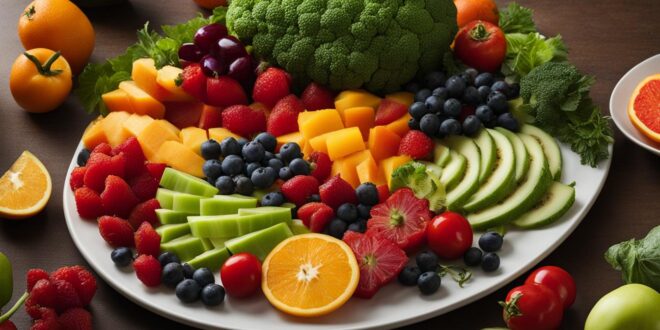Welcome to our guide on practical nutritional tips for healthy eating! Eating well is not only about satisfying hunger but also about fueling your body with the right nutrients to boost your well-being and energize your lifestyle. By making informed choices about your diet, you can improve your health and enjoy the benefits of a balanced and nutritious eating plan.
Key Takeaways:
- Healthy eating is crucial for maintaining overall well-being and energy levels.
- By following practical nutritional tips, you can make informed choices about your diet.
- A balanced and nutritious eating plan can improve your health and boost your well-being.
- Proper nutrition plays a vital role in supporting your body’s functions and maintaining a healthy weight.
- Incorporate a variety of nutrient-rich foods in your meals to ensure you’re getting a wide range of essential vitamins, minerals, and antioxidants.
The Benefits of a Balanced Diet

A balanced diet is crucial for maintaining a healthy lifestyle and reaping the numerous health benefits it offers. By incorporating a variety of nutrient-rich foods into your daily meals, you can ensure that your body receives the essential vitamins, minerals, and antioxidants it needs to thrive.
When you consume a balanced diet, you provide your body with the necessary fuel to function optimally. Fruits and vegetables offer a wide range of vitamins and minerals that support overall health and well-being. Whole grains provide fiber, which aids in digestion and helps regulate blood sugar levels. Lean proteins, such as poultry, fish, and legumes, are essential for muscle repair and growth. Additionally, healthy fats found in foods like avocados, nuts, and olive oil contribute to heart health.
“A balanced diet not only helps maintain a healthy weight but also reduces the risk of chronic diseases.”
Incorporating nutrient-rich foods into your diet can also help prevent a variety of health conditions. A balanced diet can reduce the risk of chronic diseases such as heart disease, diabetes, and certain types of cancer. It can also support brain health and improve cognitive function.
The Key Benefits of a Balanced Diet:
- Improved overall health and well-being
- Reduced risk of chronic diseases
- Enhanced brain health and cognitive function
- Increased energy levels
- Support for a healthy weight
By following a balanced diet and incorporating nutrient-rich foods into your meals, you can enjoy these benefits and pave the way for a healthier, happier life.
Easy Ways to Incorporate Healthy Foods
Incorporating healthy foods into your diet doesn’t have to be complicated. With a few simple nutrition tips, you can make quick and delicious meals that are good for your body and taste great too.
Meal Prepping
Meal prepping is an excellent way to ensure that you have nutritious meals ready to go throughout the week. Take some time over the weekend to plan and prepare your meals in advance. Chop vegetables, cook proteins, and portion out your meals into containers. This way, you’ll have healthy options on hand, saving you time and preventing you from reaching for unhealthy choices when hunger strikes.
Quick and Easy Healthy Meals
When you’re short on time, it’s essential to have a repertoire of quick and easy healthy meals that you can whip up in minutes. Salads packed with fresh vegetables, lean proteins like grilled chicken or tofu, and a drizzle of homemade dressing make for a satisfying and nutritious meal. Stir-fries are another fantastic option. Simply toss your favorite vegetables and proteins in a hot pan with some olive oil or soy sauce for a flavorful and healthy dish.
Healthy Snacks
Snacking can be a downfall for many when it comes to maintaining a healthy diet. However, with the right choices, snacking can be a great opportunity to incorporate additional nutrients into your day. Keep snacks like fresh fruits, nuts, and yogurt on hand to satisfy your cravings and provide a boost of energy. These options are not only delicious but also packed with vitamins, minerals, and fiber.
By implementing these easy nutrition tips, you can seamlessly incorporate healthy foods into your daily routine. With a little planning and some smart choices, eating well doesn’t have to be complicated.
Understanding Portion Control

Portion control is an essential aspect of maintaining a healthy diet and achieving your wellness goals. It involves being mindful of the amount of food you consume and listening to your hunger cues to ensure you’re eating the right portions. Here are some effective portion control tips to help you make healthier choices:
- Awareness is key: Take note of the portion sizes recommended for different food groups. Use measuring cups or a food scale to understand what a proper portion looks like.
- Downsize your plates: Use smaller plates and bowls to trick your mind into thinking you’re eating more than you actually are. This can help prevent overeating and promote portion control.
- Eat mindfully: Slow down and savor each bite. Pay attention to your body’s hunger and fullness cues. Stop eating when you’re satisfied, not when you’re overly full.
- Plan your meals: Preparing meals in advance allows you to portion out your food carefully. Use meal prep containers or divide your meals into individual servings to avoid going for seconds.
- Focus on nutrient density: Opt for foods that are rich in nutrients but lower in calories. Fill your plate with vegetables, lean proteins, and whole grains to ensure you’re getting the right balance of nutrients.
By practicing portion control and mindful eating, you can maintain a healthy weight, prevent overeating, and avoid unnecessary calorie consumption. Remember, it’s not just about what you eat, but how much you eat that matters for your overall well-being.
The importance of listening to hunger cues
Listening to your body’s hunger cues is a crucial part of portion control and healthy eating. When you tune in to your body, you can understand when you’re hungry and when you’re satisfied. Here are a few tips for effectively listening to your hunger cues:
- Learn the difference between physical hunger and emotional hunger. Physical hunger is a physiological response, while emotional hunger is often triggered by stress, boredom, or other emotions.
- Eat when you’re truly hungry, not out of habit or boredom. Pay attention to the signals your body sends, such as a growling stomach or a feeling of low energy.
- Avoid distractions while eating, such as watching TV or scrolling through your phone. Focus on the taste, texture, and enjoyment of each bite.
- Pause between bites to give your body time to register fullness. Put down your utensils and take a few deep breaths before continuing to eat.
By listening to your hunger cues and eating mindfully, you can develop a healthier relationship with food and make better choices when it comes to portion control.
Summary
Understanding portion control and practicing mindful eating are key components of a healthy eating routine. By being aware of portion sizes, using smaller plates, eating mindfully, and planning your meals, you can effectively control your portions and make healthier choices. Additionally, listening to your hunger cues and distinguishing between physical and emotional hunger can help you develop a healthier relationship with food. Incorporating these portion control tips into your daily life will contribute to your overall well-being and support your journey towards a healthier lifestyle.
The Impact of Sugary Drinks and Processed Foods

Sugary drinks and processed foods have become increasingly popular in our modern diet, but their impact on our health can be detrimental. These food and beverage choices are often high in added sugars, unhealthy fats, and artificial additives, which can lead to a variety of negative effects on our bodies.
The Effects of Sugary Drinks
Sugary drinks, such as sodas, energy drinks, and fruit juices, provide empty calories without offering any substantial nutritional value. Consuming these beverages regularly can contribute to weight gain and increase the risk of developing chronic diseases like obesity, type 2 diabetes, and heart disease. Additionally, the high sugar content in sugary drinks can lead to tooth decay and negatively affect dental health.
It’s important to limit your consumption of sugary drinks and opt for healthier alternatives like water, herbal teas, or unsweetened beverages. These choices will not only help reduce your sugar intake but also support overall health and hydration.
The Risks of Processed Foods
Processed foods, including pre-packaged snacks, frozen meals, and fast food, are typically loaded with unhealthy ingredients like added sugars, sodium, and trans fats. These additives not only contribute to weight gain but also increase the risk of developing chronic conditions like heart disease, high blood pressure, and inflammation. Consuming excessive amounts of processed foods can also lead to poor nutrient absorption and deficiencies, as they often lack essential vitamins, minerals, and fiber.
Choosing whole, unprocessed foods as alternatives to processed options is crucial for maintaining a healthy diet. Opt for fresh fruits and vegetables, lean proteins, whole grains, and healthy fats. These nutrient-dense choices will provide you with the necessary nourishment while reducing your intake of unhealthy additives.
By making informed choices and opting for healthier alternatives, we can minimize the negative impact of sugary drinks and processed foods on our health. It’s important to prioritize whole, unprocessed foods and beverages that nourish our bodies and support our overall well-being.
Tips for Healthy Snacking

Snacking can be a delightful and nutritious part of a healthy eating routine, as long as it’s done mindfully. When choosing snacks, opt for nutrient-dense options that provide essential vitamins and minerals. Here are some tips for healthy snacking:
- Choose fresh fruits: Fresh fruits are not only delicious but also packed with vitamins, fiber, and antioxidants. Keep a variety of fruits on hand, such as apples, berries, and oranges, for a quick and refreshing snack.
- Pair vegetables with hummus: Vegetables like carrots, celery, and bell peppers make excellent snack choices. Add some flavor and protein by pairing them with a serving of hummus.
- Enjoy Greek yogurt with nuts: Greek yogurt is rich in protein and calcium, making it a satisfying and nutritious snack option. Sprinkle some nuts, such as almonds or walnuts, for an extra crunch and healthy fats.
- Make homemade energy bars: Skip the commercially processed energy bars and make your own at home. Combine ingredients like oats, nuts, dates, and honey to create a delicious and wholesome snack.
Mindful snacking involves paying attention to your body’s hunger and fullness cues, as well as making conscious choices about the foods you eat. Snack in moderation and avoid mindlessly reaching for unhealthy options high in sugar and unhealthy fats. By incorporating these tips into your snacking routine, you can enjoy delicious and nutrient-dense choices that support your overall well-being.
The Importance of Hydration
Staying hydrated is essential for maintaining optimal health and well-being. Proper hydration plays a vital role in numerous bodily functions, including digestion, metabolism, and brain function. By drinking water throughout the day, you can ensure that your body stays adequately hydrated and functioning at its best.
One of the key benefits of staying hydrated is that it helps to reduce your intake of sugary drinks. Sugary beverages like sodas and fruit juices are often high in calories and can contribute to weight gain and other health issues. By choosing water as your primary source of hydration, you can eliminate unnecessary sugar from your diet and promote a healthier lifestyle.
Drinking water also offers a range of other benefits. It helps flush out toxins from your body, aids in digestion, and supports healthy skin. Additionally, staying hydrated can help prevent headaches, muscle cramps, and fatigue.
Remember, reducing your sugary drink intake and prioritizing water consumption is a simple yet effective step towards better health. So, keep a water bottle with you throughout the day and make a conscious effort to stay hydrated.
Here are a few tips to help you stay hydrated:
- Carry a reusable water bottle wherever you go to ensure you have access to water at all times.
- Set reminders on your phone or computer to drink water regularly throughout the day.
- Infuse water with fruits or herbs to add flavor and make it more enjoyable to drink.
- Consume hydrating foods such as watermelon, cucumbers, and oranges, which have high water content.
By prioritizing hydration and making water your beverage of choice, you can support your overall well-being and maintain a healthy lifestyle.
Incorporating Physical Activity
Physical activity is a crucial component of a healthy lifestyle, complementing your efforts in maintaining a nutritious diet. By incorporating regular exercise into your routine, you can optimize your overall well-being and promote healthy habits.
Engaging in an active lifestyle can have numerous benefits for both your physical and mental health. It helps to maintain a healthy weight, improves cardiovascular health, strengthens muscles and bones, and enhances mood and mental clarity.
To reap the rewards of an active lifestyle, find activities that you enjoy and make them a part of your daily routine. Whether it’s going for a walk or jog, biking, swimming, dancing, or participating in organized sports, choose activities that keep you motivated and bring you joy. Remember that every movement counts, so even small changes like taking the stairs instead of the elevator or stretching during breaks can contribute to your overall fitness.
Creating Healthy Habits
Integrating physical activity into your life is about building healthy habits that last. Start by setting realistic goals and gradually increasing the intensity and duration of your workouts. You can also incorporate exercise into your daily activities by walking or biking to work, doing household chores, or playing with your children or pets.
“Exercise is a celebration of what your body can do. It’s not just about weight loss, it’s about strength, endurance, and overall well-being.”
– Unknown
Remember to listen to your body and provide it with proper rest and recovery. This will help prevent injuries and allow your muscles to repair and grow stronger. Additionally, fuel your body with nutritious foods to support your physical activities and maximize their benefits.
By prioritizing an active lifestyle, you can create a harmonious balance between exercise and nutrition, promoting optimal health and longevity.
Conclusion
Summing up the importance of healthy eating, it is clear that maintaining overall well-being and embracing a healthy lifestyle go hand in hand. By applying practical nutritional tips and making informed choices about your diet, you can enhance your health and vitality.
Achieving and maintaining well-being begins with incorporating a balanced diet. By including a variety of nutrient-rich foods such as fruits, vegetables, whole grains, lean proteins, and healthy fats, you provide your body with essential vitamins, minerals, and antioxidants.
Moreover, practicing portion control and mindful eating are pivotal for managing a healthy weight and preventing overeating. Be attentive to hunger cues and use portion control techniques, like using smaller plates and measuring serving sizes, to ensure you’re consuming appropriate amounts of food.
In conclusion, prioritizing healthy eating is the key to maintaining a healthy lifestyle and overall well-being. By embracing a balanced diet, practicing portion control, and making mindful food choices, you pave the way for long-term health benefits. Embrace healthy eating as a lifelong commitment and enjoy the rewards of a vibrant and energized existence.
 Fullersears
Fullersears





